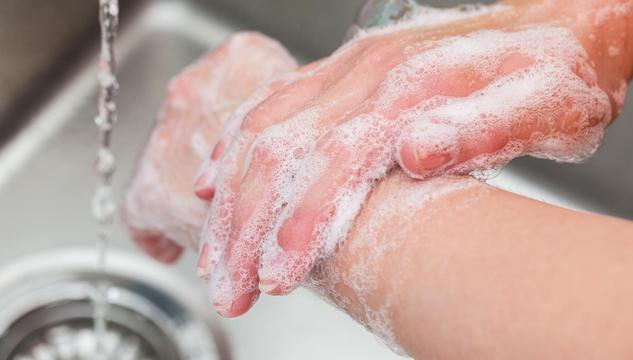Since COVID-19, the simple act of hand-washing has been elevated beyond the mundane into a public health headline and potentially life-saving act.
People wash their hands now. Soaps and sanitisers are in demand, and also ubiquitous – in handbags, backpacks, at pub and shop doors.
This is undeniably a good thing. But for Monash University researcher Professor Trevor Lithgow, who works on superbugs that are resistant to medicines and predicted to kill 10 million people a year by 2050, it’s a dilemma. The questions he’s been asking himself and his team are: “Is this a good time or a bad time to get involved in health advice over hand-washing? Can we come up with a message that does good?”
Professor Lithgow is Director ofMonash’s Centre to Impact AMR, a group of 200 scientists and researchers working to stop the spread of antimicrobial resistance (AMR), or antibiotic resistance, in superbugs. This is where bacteria become resistant to medicines, and people die.
He and his colleagues have been convinced for some time that they needed to start talking in public about hand-washing, and about certain additives in soaps that feed the superbug scourge and do more harm than good.
Then COVID happened, and the decision was made to wait. Until now.
Changing the hand-washing message
The message is not how to wash your hands – it’s what to wash your hands with. This is because many liquid soaps contain “antimicrobial” or “antibacterial” elements that, when rubbed on hands and then washed down the sink, contribute to anti-microbial resistance and create superbugs.
In the United States, the Food and Drug Administration (FDA) in 2016 banned 19 chemicals from soaps, including the two most prominent – triclosan and triclocarban. The reason the FDA gave was that the added chemicals did nothing.
“Consumers may think antibacterial washes are more effective at preventing the spread of germs, but we have no scientific evidence that they’re any better than plain soap or water," Dr Janet Woodcock, Director of the FDA'sCenter for Drug Evaluation and Research, said in a statement.

Monash’s Centre to Impact AMR’s new stance adds to the public health message by giving another reason not to use them – not only do they do nothing, they’re bad for the human environment and healthcare. The science isunequivocal on that.
“If I wash my hands constantly with antibacterial or antimicrobial soaps,” says Professor Lithgow, “the microbes that live on my hands will be constantly barraged by antimicrobials, and they’ll become superbugs. So I end up carrying superbugs with me wherever I go.
“Then, if I cut my hand in the garden, the thing that goes into my bloodstream is whatever was on my hands at the time, and if those are drug-resistant bacteria, it doesn’t matter how fast I get to hospital, I have an untreatable infection.”
Demand for household soaps with antimicrobial additives has risen during the COVID-19 pandemic, with consumers under the mistaken impression they provide better protection against germs and disease.
Overuse of antibiotics is the main driver of superbugs but, according to Professor Lithgow, the potential problems caused by soaps with additives means these soaps should be banned. He says inserting antibacterials or antimicrobials in soaps is good for marketing, but not good for health.
“What purpose do they serve?” Professor Lithgow asks. “I have tried to think about this and figure out whether there’s an industry reason other than a marketing advantage. It makes people think it’s a better product. The thought is, ‘I want my hands to be sterile, so I use antibacterial soaps’. But it’s a false logic and a misunderstanding people have.”
Last year, Monash University started phasing out antimicrobial and antibacterial soaps on campuses.
Read more: Thermobifida fusca: the manure-dwelling 'hot bug' that may result in life-saving antibiotics
Antimicrobial additives are also found in laundry and cleaning products, where they get washed down the sink in larger quantities. The Australian soap and cleaning compound industry is estimated to be worth $2.5 billion, according to IBISWorld.
Professor Lithgow said some dishwasher cleaners contained the additives in question. “Create a problem, then create a solution,” he says. “Great advertising, but bad for us.”
Time to talk about a public health campaign
On balance, he says, the time is right to start talking about it all. In lieu of new government regulations (like in the US) banning certain additives, there needs to be a public health campaign. Professor Lithgow says the Centre to Impact AMR wants to start that conversation.
“You don’t want to be cultivating drug-resistant bacteria,” he says. “This is not an esoteric issue; it’s about our homes and workplaces and waterways, and this is something people will care about. Part of our job should be that we can help the public to understand more about antimicrobial resistance and superbugs.
“The message is, soaps are good. Keep using them. Keep washing your hands. But antibacterial additives in soap are not good. You don’t need them, so don’t buy the soaps that include them. It’s in your hands.”
